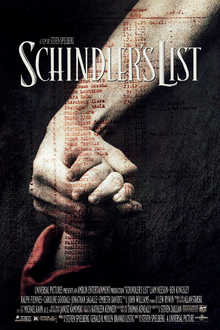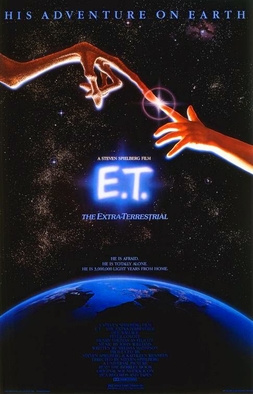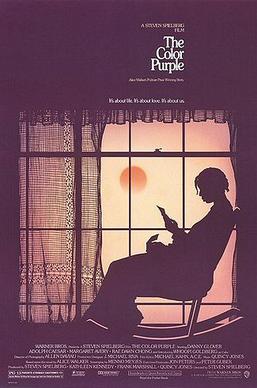 #894- Schindler's List (1993)
#894- Schindler's List (1993)Starring: Liam Neeson, Ben Kingsley, Ralph Fiennes
Directed by: Steven Spielberg
Plot Summary: In 1939, the Germans move all Polish Jews into the Krakow Ghetto as World War II begins. A member of the Nazi Party, businessman Oskar Schindler arrives in the city and through bribes is able to acquire a factory to produce enamelware. Schindler seeks the aid of Itzhak Stern to help run his business, while also maintaining a friendly relationship with the Nazis. In an effort to be more cost effective, Schindler hires Jewish workers, with Stern securing as many workers as possible to ensure they aren't sent to the concentration camps to be killed. When a new concentration camp is built, Second Lieutenant Amon Goeth orders the Ghetto to be liquidated, with Schindler seeing many Jewish people hunted down and killed. Affected by the extermination in the Ghetto, Schindler moves his focus from making money to saving lives, while also keeping his friendship with Goeth at a distance. After being charged with a huge bribe from Goeth, Schindler and Stern create a list of people to be transferred to Brinnlitz, thus saving them from being shipped to Auschwitz.
It kind of sucks to end the year on such a sorrowful note, but there had to be a time when I approached Schindler's List and I thought now would be as good a time as any to cover it. This movie was a serious game changer for Steven Spielberg, covering the tragedy of the Holocaust and Oskar Schindler's attempts to save the lives of Polish-Jewish refugees. I saw this film last year when I was in film class, as a project to rank Spielberg's best pictures and it found its way near the very top of the list. However, I will blatantly acknowledge it's not a film I would go out of my way to watch over and over again. That's not saying it's bad, don't get me wrong. The problem is in the film's content, which can range from visually stunning to completely disturbing. Still, it can't be denied that Schindler's List is a masterpiece of filmmaking and will go down as one of the greatest movies in Spielberg's legendary career.
 Liam Neeson stars in the iconic role of Oskar Schindler. At the time of production, Neeson was cast because he wasn't the star he was today. When actors like Kevin Costner and Mel Gibson auditioned for the role, Spielberg chose Neeson so audiences wouldn't be distracted by the star power of an A-list actor. Nowadays, he's known for Taken and stuff like that, but this was his big breakout role. Schindler doesn't exactly start out as the hero we're expecting. He's cocky and flashy and flaunts his wealth and status around. It's only through the events of the Holocaust that he is actually driven to do something meaningful to rescue the Jews. As you see him transition, you really grasp onto him and find him likable. You see his generosity prosper and a good person is developed. One of the film's biggest highlights is near the end where Oskar completely breaks down in awe of what he has accomplished and still believes that he hasn't done enough. It's moments like that that really prove Schindler's worth as the film's hero. Even more fascinating is how he's able to do all these things while being so close to the Nazis, making him look like a mastermind and the Nazis look like complete schmucks.
Liam Neeson stars in the iconic role of Oskar Schindler. At the time of production, Neeson was cast because he wasn't the star he was today. When actors like Kevin Costner and Mel Gibson auditioned for the role, Spielberg chose Neeson so audiences wouldn't be distracted by the star power of an A-list actor. Nowadays, he's known for Taken and stuff like that, but this was his big breakout role. Schindler doesn't exactly start out as the hero we're expecting. He's cocky and flashy and flaunts his wealth and status around. It's only through the events of the Holocaust that he is actually driven to do something meaningful to rescue the Jews. As you see him transition, you really grasp onto him and find him likable. You see his generosity prosper and a good person is developed. One of the film's biggest highlights is near the end where Oskar completely breaks down in awe of what he has accomplished and still believes that he hasn't done enough. It's moments like that that really prove Schindler's worth as the film's hero. Even more fascinating is how he's able to do all these things while being so close to the Nazis, making him look like a mastermind and the Nazis look like complete schmucks.Schindler does a lot of the outside work though. The real MVP of the Holocaust in this film should be Itzhak Stern, played by Ben Kingsley. Stern assists Schindler on all his decisions during this time and is even thrown into a lot of the peril of the Holocaust. He's a pair of eyes within the concentration camps, and you can see the personal hell he is undergoing, and you can only imagine how many actually suffered during this time. Kingsley does a good job at playing Stern as both meek and stubborn when he needs to be. We mostly see him meek during the Holocaust, but he holds his own very well alongside Schindler, and even gets mouthy and sarcastic. As the film progresses, you can definitely see and partnership and friendship develop between the two and it's very rewarding to see since both have undergone the same tragic events, just from different points of view. In the end, Itzhak Stern should receive as much credit as Schindler for actually undergoing personal sacrifice for the safety of his people.
If you thought Ralph Fiennes was a crazy and psychotic villain as Lord Voldemort, you ain't seen nothing yet. As Second Lieutenant Amon Goeth, Fiennes plays an absolutely fascinating character. Goeth is so charismatic, yet so diabolical in his actions. There are so many times where you cannot hold the man to his word because he will say one thing to the Jews and do another. There's an actual scene (the "I pardon you," scene) where Goeth is told by a young boy (looks to be teenage) that he failed to do a task, he pardons the boy, sends him on his way, and then shoots him anyways. WHAT THE HECK?!!?!? But the worst is when he has a fixation towards a Jewish woman Helen Hirsch, played by Embeth Davidtz. He treats this woman like garbage, objectifies her, and is constantly battling his feelings for her. Can you say HYPOCRITE!?!?! There's no method to his madness, and the worst part of it all....is that there is STILL something engaging about his character. Whether you love to hate him, or just straight up hate him, Amon Goeth is definitely a character that you will leave this film remembering.
If you've seen Schindler's List before, or are watching it as you read this review, you're probably feeling REALLY uncomfortable about what you're seeing right? That's because Spielberg does such an amazing job of creating an atmosphere that sticks the audience right in the middle of the Holocaust. The events that play out for the next 3 hours are absolutely gruesome and really opened a lot of eyes to the horrors of the Holocaust. I'd rather not go into detail for two reasons: the first being I try my best to avoid spoilers unless absolutely necessary (and it isn't here), and the second being that there are too many shocking scenes to choose from that I wouldn't know where to start. I will take the time to point out one little factor that helped create atmosphere: color. As you can see, the film is primarily in black and white. Yet here, we see a little girl in a red coat. That's there for a reason. Without giving too much away, Schindler sees this girl early on in the film, and sees the coat again later (make of that what you will). From there, it's really the turning point for Schindler as a character. It motivates and kicks him into a higher gear to save as many Jewish people as he can. It's through the color of this coat that the events finally begin to feel real to him. The coat is also the subject of many discussions over its true symbolism, ranging from innocence, to the blood spilled during the Holocaust, to Spielberg's social commentary of how the United States knew about the Holocaust and did nothing to stop it. Whatever the reason, the use of color is definitely one of the film's most iconic qualities for setting the proper tone.
Schindler's List really elevated Spielberg's game to being a more serious director than previously credited for. At this time, we knew him mainly for his sci-fi and fantasy films. So along comes such a gritty and enticing depiction of one of the darkest periods in history, that it stuns audiences and critics. The film was considered a cinematic accomplishment that won Spielberg his first Academy Award for Best Director, as well as winning Best Picture, Best Adapted Screenplay, Best Art Direction, Best Cinematography, Best Film Editing, and Best Original Score. Needless to say, the film was considered a huge success. It is from this point onward that Spielberg was able to make both his whimsical family films, as well as compelling historical dramas. Without Schindler's List, we would never have War Horse, or Saving Private Ryan, or Lincoln (we'll get to those two next month). You can only imagine at the time how surreal it must have been for audiences to witness the man who made E.T. releasing an epic Holocaust drama. I hope no parents saw his name attached and thought it was a family picture.
Rating: 5 out of 5 stars
There aren't many films like this that can generate so many responses from me as a viewer. It's beautiful and disturbing, tragic and epic, inspiring and deflating all at once. With over 3 hours in length, Schindler's List isn't the kind of film I would imagine general moviegoers watching over and over again, but it is definitely worth watching at least once by everyone who considers themselves a movie buff. Bonus points if you make out during it and don't feel bad about yourself (and if you don't get that Seinfeld reference...I pardon you).
Schindler's List and movie images are copyrighted by Universal Pictures












